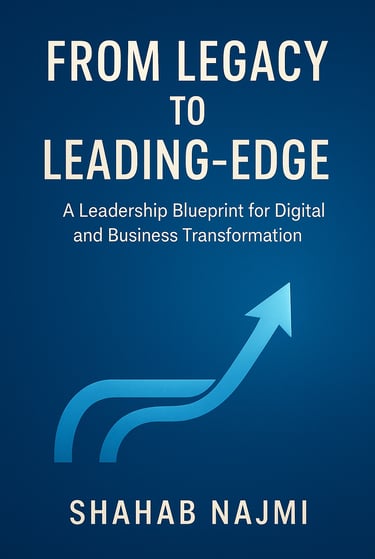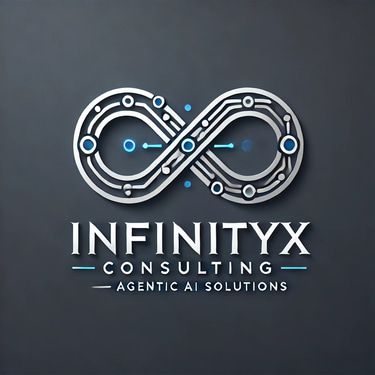From Legacy to Leading Edge:
A Leadership Blueprint for Digital and Business Transformation
Chapter 1: A missed opportunity
The heir apparent
John Black, in his late forties, had done well in the workplace and delivered for his organization, DataTech Corp, which was a leading Information Technology (IT) System Integrator based in Riyadh, Saudi Arabia. John felt that he was now a veteran in this organization and had progressed to the position of 'Senior Program Manager' for a large and important customer, a conglomerate called Falconridge Group. He was widely anticipated to be promoted to the 'Account Director' role, managing projects as well as the service delivery organization based on his previous successes in the project delivery area. He was respected, if not always liked, and had a solid relationship with the customer’s management team.
When he applied for the Account Director position, John did not see too many rivals within the organization. However, he did expect competition from outside candidates as DataTech Corp was a regional leader, and the position was a coveted one in the industry. Still, John was confident in his chances since the organizational policy gave preference to internal candidates who were qualified for key organizational roles.
John awaited the announcement patiently for several weeks, but it was not forthcoming. Around a month after his application, he was called into a meeting with the current Falconridge Account Director, who was his Line Manager, and the company’s Deputy COO. He had anticipated this to be his crowning moment, but as he entered the Director's office, the mood was somber. John began to feel uneasy. Mohammed, the retiring Account Director, asked him to sit down. The Deputy COO, Martin, was distracted by a phone call.
Martin hung up and turned to face John. "John, although you were a strong candidate, I am afraid you were not selected for the Account Director role," said Martin, rather coldheartedly. John was baffled. He was lost for words and couldn’t think clearly. How could this have happened? He uttered, "Who …?".
"We have selected Roger to be the new Account Director. This shall be announced tomorrow." Martin replied simply. John was shocked at hearing this, Roger had joined the organization less than two years ago. While he was generally considered a high performer, John had not even been aware that he was a serious candidate because of his young age and lack of experience in both projects and services, which were part of the requirements for this prestigious role.
"Thank you.", said John, and he left the room without further comment. He was disillusioned by all this and felt like throwing in the towel there and then. "This is so unfair", he thought, "what else could I have done to get this promotion?" Presently, he didn’t feel like being there, so he left the building in a state of disbelief.
John returned to his car and drove to his favorite coffee shop to help him think. He ordered his usual Latte without thinking and began sipping it absentmindedly. After some minutes, he started to get some clarity. Yes, Roger was young and less experienced, but he was well regarded within the organization. John knew Roger well, as he was part of the IT Service Delivery team and used to interact with him regularly. He always seemed to know what he was talking about, was well-liked by all, and, perhaps most importantly, he was highly organized. He was known to be hard-working but not overly so. He was always the person people went to solve their problems. Despite all this, John could not believe the apparent injustice of the situation. "I have worked day and night for this organization for the last 15 years!"
John mentally acknowledged, albeit grudgingly, that Roger would be a decent choice for this role, but he could not bring himself to think of any one characteristic that made Roger a better choice. He was less furious now, yet the question was still open in his mind - what made Roger deserve the promotion more than he did? He was still convinced that it was not a fair choice and contemplated all possible reasons for it - golf buddies, personal relationship with any of the management team, nepotism - though nothing seemed obvious.
Skill gaps
He was still grappling with all these queries when he saw a senior colleague come through the door of the coffee shop. He went to Abdullah, as he often found him a fair-minded person whom he could talk to. He said, "Did you hear the news, Abdullah? They selected Roger to be the Falconridge Account Director. Can you believe that?". Abdullah could sense the slight disdain in John's voice as he said this. He was more than aware of the sensitivity of the situation and asked John if we wanted another coffee. John was in no mood to go back to his office just yet and was desperate for a discussion, so he accepted the offer immediately.
Abdullah then asked him to explain what had happened.
"Well, they've selected Roger to be the new Director - there were several more qualified candidates for the position…" said John.
Abdullah did not want to exacerbate an already difficult conversation by saying something that might upset John even more. He cautiously asked John, "What was the qualification for the role, John?".
John explained, "The role concerns management of the entire Falconridge Group account, including projects and services delivery - managing over 100 people and businesses worth $50 million per year."
"What sort of a person is fit for this role?" Abdullah inquired.
"The role is to manage the project teams as well as service teams and have a strong relationship with Falconridge organization and management. The right person should have managed people and know projects as well as services. He should be respected by the customer." John said.
Carefully probing with a view to mentoring him, Abdullah queried, "That is an excellent way of looking at this role. However, at this level what else is important? How about the strategic parts of the role, and what about processes, technology, and governance?".
John was not expecting this question and had always considered processes and governance to be a nuisance that you have to deal with to deliver your projects. Governance meant the people at the Project Management Office (PMO) and processes were followed but were never too useful in his mind. He never had a good relationship with the Project Management Office (PMO) and considered their processes to be a waste of time. However, he was diplomatic in his response.
"Our company is very process driven and has a large PMO for governing our projects. Processes and governance are useful for quality, but our PMO isn’t very good. Many processes are outdated and do not add much value. In fact, following them usually causes delays to our projects. However, we have to work with whatever processes our PMO mandates." John replied uncomfortably.
"How do you think we can ensure that the governance is in support of the delivery organization goals, and who is responsible for making sure that we deliver our strategies, and who influences them?" asked Abdullah.
"Senior management" was the simple response.
"Who among the senior management do you think provides operational inputs?" Abdullah quizzed John.
John had to think on this one; the senior people in operations are the COO, Deputy COO, and a handful of Account Directors. Thus, the 'management' included the very position John had applied for. This made him feel a little embarrassed about his previous reply.
Abdullah did not grill him on it but asked simply, "The organization respects your contributions very much, John, but we can discuss the skills needed to join the senior management. This is not a quick coffee discussion, unfortunately, so we will need some time to understand if there may be some gaps in your knowledge and experience."
“I certainly don't believe Roger is ready for joining Senior Management!" John thought to himself, but he said nothing.
Abdullah asked him, "In the current business environment, the Falconridge Account Director role is going to be extremely challenging. If you are willing, then we can spend some time together to respond to the question about your readiness for a role like this one.".
John was still upset and wanted to end the conversation. However, knowing how influential Abdullah was and also knowing that Roger was also mentored by him, he contemplated the offer. He was, without a doubt, skeptical of the intentions. He crudely replied, "When would we have time to work together?".
"Are you an early riser, John? I get up around 5 am and then go for a run. I can meet you at 5.30 am once or twice a week to discuss the skills required of a Director in this organization. I enjoy mentoring and have worked with several of our senior leaders in this organization. Are you up for it?".
John, still hurt, was willing to give this a chance. After all, being mentored by one of the most well-respected people in the organization couldn’t hurt. He mustered a smile and said, "Of course, thank you!".


Buy the book from any of our partners

